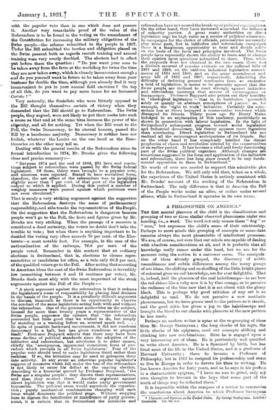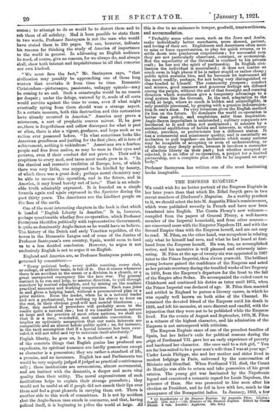A PHILOSOPHER ON AMERICA.* Tus first mental pleasure of the
child is the classification and grouping of two or three similar observed phenomena under one heading, Le., a word. The word not.only names them " dog " or " man," but expresses the child's sense of their relationship. Perhaps to most minds this grouping of concepts or sense-data remains always the most pleasurable of intellectual prooesses. We are, of course, not sure that our minds are capable of dealing with absolute considerations at all, and it is probable that all .knowledge really comes under this head, but we are for the moment using the notion in a narrower sense. The manipula- tion of ideas already grasped, the discovery of subtle resemblances and subtle differences among the many groups of our ideas, the shifting and re-shuffling of the little bright pieces of coloured glass we call knowledge, are for ever delightful. That is, indeed, half the pleasure of the real kaleidoscope—to see how the red shines like a ruby now it is by that orange, or to perceive the radiance of the blue now that it is eat about with the glossy black. This is perhaps why good criticism of any art is so delightful to read. We do not perceive a new aesthetic phenomenon, but we have grown used to the pattern as it stands, and the good critic has given a jog to the kaleidoscope and brought the blood to our cheeks with pleasure at the new pattern he -has made.
Perhaps no modern writer is apter at the re-grouping of ideas than Mr. George Santayana ; the long shocks of his logic, the little shocks of his epigrams, send our concepts shifting and chinking into new combinations. Here he is engaged upon a very interesting set of ideas. He is particularly well qualified to write about America. He is a Spaniard by birth, but has lived most of his life in the United States, and is a graduate of Harvard University ; there he became a Professor of Philosophy, but in 1912 he resigned his professorship and came to live in Europe is order to devote his time to writing. He has known America for forty years, and as he says in his preface in a characteristic epigram, " I have no axe to grind, only my own thoughts to burnish in the hope that some part of the truth of things may be reflected there."
It is impossible within the compass of a review to summarize the conclusions about America to which Professor Santayane
• Character and Opinion in the Veiled States. By George Santayana. London: Constable. ies. ed. net.
tomes ; to attempt to do so would be to distort them and to rob them of all subtlety. Had it been possible to state them in two words, Professor Santayana is not the man who would have stated them in 230 pages. We can, however, indicate his rea3ons for thinking the study of America of importance to the world in general. In addressing an English audience he need, of course, give no reasons, for we always do, and always shall, show both interest and inquisitiveness in all that concerns our own kindred.
" We must face the fact," Mr. Santayana says, "that civilization may possibly be approaching one of those long Winters that overtake it from time to time. Romantic Christendom—picturesque, passionate, unhappy episode—may lie coming to an end. Such a catastrophe would be no reason
for despair ; under the deluge, watered by it, seeds of all sorts would survive against the time to come, even if what might
eventually spring from them should wear a strange aspect. In a certain measure, both this destruction and this restoration have already occurred in America." America may prove a microcosm, a sort 'of prophetic convex mirror. If, he goes on, there is forgetfulness and callow disrespect for what is past or alien, there is also a vigour, goodness, and hope such as no nation ever possessed before. "In what sometimes looks like American greediness and jostling for the first place, all is love of achievement, nothing is unkindness." Americans are a fearless people and free from malice, as may be seen in their eyes and gestures, even if their conduct did not prove it. Their soil is propitious to every seed, and tares must needs grow in it. " In the classical and romantic tradition of Europe, love, of which there was very little, was supposed to be kindled by beauty, of which there was a great deal ; perhaps moral chemistry may be able to reverse this operation, and in the future, and in America, it may breed beauty out of love." That is an admir- able truth admirably expressed. It is founded on a simple formula again and again expressed in the Spectator during the past thirty years. The Americans are the kindliest people on the face of the earth.
One of the most interesting chapters in the book is that which is headed " English Liberty in America," It is, however, perhaps questionable whether free co-operation, which Professor pantayana identifies politically with representative Government, is quite as dominantly Anglo-Saxon as he would have us believe.
The history of the Dutch and early Venetian republics, of the towns in the Hanseatic League and of some of the Juntas of Professor Santayana's own country, Spain, would seem to lead us to a less decided conclusion. However, to argue it not exclusively English is not to argue it un-English.
England and America are, as Professor Santayana points out, governed by committees:
" Every political body, every public meeting, every club, or college, or athletic team, is full of it. Out it comes whenever there is an accident in the street or a division in a church, or a great unexpected emergency like the late war. The general instinct is to run and help, to assume direction, to pull through somehow by mutual adaptation, and by seizing on the readiest practical measures and working compromises. Each man joins m and gives a helping hand, without a preconceived plan or a prior motive. Even the leader, when he is a natural leader and not a professional, has nothing up his sleeve to force on tho rest, in their obvious good-will and mental blankness. . . . Now, this method of procedure will probably seem to the reader quite a natural one ; but if we consider human nature at large and the practice of most other nations, we shall see that it is a rare, wonderful, and unstable convention. It implies an optimistic assu,mption that our main interests are compatible and an almost heroic public spirit ; as, for instance, in the tacit assumption that if a special interest has been over- ruled it will not rebel and try to maintain itself absolutely."
English liberty, he goes on, is a method—not a goal. Most of the concrete things that English genius has produced are expedients, its spiritual treasures are hardly possessions except as character is a possession; they are rather a standard of life, a promise, and an insurance. English law and Parliaments too would be very unjustly judged if judged as practical contrivances only ; these institutions are ceremonioue, almost sacramental, and are instinct with the dramatic, a deeper and more vital
quality than their utility. The moral expressiveness of such institutions helps to explain their strange procedure ; they would not be useful at all if people did not smack their lips over them and feel a great pleasuie in carrying them out. There is another side to this work of committees. It is not by accident that the Anglo-Saxon race excels in commerce, and that, having
policed itself, it is beginning to police the world at large. All this is due to an eminence in temper, goodwill, trustworthiness,
and accommodation.
" Probably some other races, such as the Jews and Arabs, make individually better merchants, more shrewd, patient, and loving of their art. Englishmen and Americans often seem to miss or force opportunities, to play for quick returns, or to settle down into ponderous corporations ; for successful men they are not particularly observant, constant, or economical. But the superiority of the Oriental is confined to his private craft ; he has not the spirit of partnership. In English &el• bastion the individual is neutralised ; it does not matter so much even in high places if be is rather stupid or rather cheap ; public spirit sustains him, and he becomes its instrument all the more readily, perhaps, for not being very distinguished or clear-headed in himself. The community prospers ; comfort and science, good manners and generous feelings are diffused among the people, without the aid of that foresight and cunning direction which sometimes give a temporary advantage to a rival system like the German. In the end, adaptation to the wor14 at large, where so much is hidden and unintelligible, is only possible piecemeal, by groping with a genuine indetermina- tion in one's aims. Its very looseness gives the English method its lien on the future. To dominate the world co-operation is better than policy, sad empiricism safer than inspiration. Anglo-Saxon imperialism is unintended ; military conquests are incidental to it and often not maintained ; it subsists by a mechanical equilibrium of habits and interests, in which every colony, province, or protectorate has a different status. It hue a commercial and missionary quality, and is essentially an invitation to pull to ether—an invitation which many nations may be incapable of accepting or even of understanding, or which they may deeply scorn, because it involves a surrender of absolute liberty on their part ; but whether accepted or rejected, it is an offer of co-operation a project for a limited partnership, not a complete plan of life to be imposed on any. Y•"
Professor Santayana has written one of the most fascinating books imaginable.











































 Previous page
Previous page